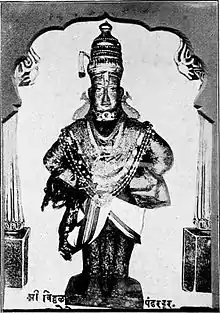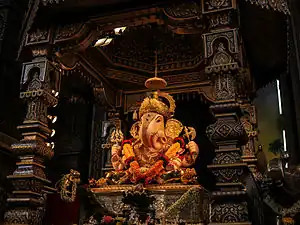Hinduism in Maharashtra
Hindus form 79.83% of the state's total population as per 2011 census. Hindus form the majority in all the districts of the state.The religion plays an important role in the lives of the Maharashtrian people in their day-to-day life. Vitthoba, along with other incarnations of Vishnu such as Rama and Krishna, Hanuman, Dattatreya, and Shaiva deities such as Shiva, Parvati, and Ganesha, are popular with Hindus of Maharashtra. The Varkari tradition holds a strong grip on the local Hindus of Maharashtra.[1]: 140–170 The public Ganesha festival started by Bal Gangadhar Tilak in the late 19th century is very popular. Marathi Hindus also revere Bhakti saints associated with varkari sects such as Dnyaneshwar, Savata Mali, Tukaram, Namdev, Janabai, and Chokhamela. Many religious figures from 19th and 20th century are revered. They include Swami Samarth, Gajanan Maharaj, Sai baba of Shirdi, Tukdoji Maharaj, Gondavalekar Maharaj, and Gadge Maharaj.

In every village of Maharashtra, at least one Hindu temple can be found. Maharashtra also has significant Hindu populations with origins in other states and regions of India, which adds to the diversity of temples and traditions in the state. The state has numerous recently built temples by groups such as the Swaminarayan sect, ISKCON, and South Indian communities.
Tradition
Varakari is a major tradition followed by Marathi Hindus. Varakaris are Vaishnav devotees. Vththal is a deity worshipped mostly in Varakari tradition. The main Deity worshipped in Maharashtra is Krishna in the form of Viththal.
Deities

Maharashtrian Hindus worship many deities that belong to the traditions of Vaishnavism and Shaivism, most prominently the following:
- Vitthala/Vithoba or Panduranga, a form of Krishna
- Krishna
- Parashurama.
- Rama
- Hanuman
- Shiva
- Khandoba, an avatar of Shiva.
- Ganesha
- Dattatreya
Demographics
The following data is taken from 2001 Census of India.
Hindus by district in Maharashtra
|
District |
Total Population |
Population Under 6 Years |
Hindu Population |
Hindu Population Under 6 Years |
HINDUS % |
Hindus Under6 % |
Birth Rate ('95 to '01) |
H Birth Rate |
| Nandurbar | 1,311,709 | 230,213 | 1,198,481 | 212,040 | 91.37% | 92.11% | 29.25 | 29.49 |
| Dhule | 1,707,947 | 255,231 | 1,522,895 | 224,249 | 89.17% | 87.86% | 24.91 | 24.54 |
| Jalgaon | 3,682,690 | 525,668 | 3,049,368 | 418,615 | 82.80% | 79.63% | 23.79 | 22.88 |
| Buldana | 2,232,480 | 340,294 | 1,622,192 | 235,708 | 72.66% | 69.27% | 25.40 | 24.22 |
| Akola | 1,630,239 | 235,835 | 1,024,080 | 137,396 | 62.82% | 58.26% | 24.11 | 22.36 |
| Washim | 1,020,216 | 160,486 | 746,841 | 115,450 | 73.20% | 71.94% | 26.22 | 25.76 |
| Amravati | 2,607,160 | 357,834 | 1,883,148 | 253,784 | 72.23% | 70.92% | 22.88 | 22.46 |
| Wardha | 1,236,736 | 155,612 | 1,006,235 | 127,993 | 81.36% | 82.25% | 20.97 | 21.20 |
| Nagpur | 4,067,637 | 525,850 | 3,090,588 | 400,720 | 75.98% | 76.20% | 21.55 | 21.61 |
| Bhandara | 1,136,146 | 154,051 | 953,507 | 131,228 | 83.92% | 85.18% | 22.60 | 22.94 |
| Gondiya | 1,200,707 | 171,191 | 1,041,802 | 149,839 | 86.77% | 87.53% | 23.76 | 23.97 |
| Gadchiroli | 970,294 | 154,744 | 818,640 | 130,989 | 84.37% | 84.65% | 26.58 | 26.67 |
| Chandrapur | 2,071,101 | 279,490 | 1,680,113 | 229,457 | 81.12% | 82.10% | 22.49 | 22.76 |
| Yavatmal | 2,458,271 | 369,402 | 1,999,368 | 299,748 | 81.33% | 81.14% | 25.04 | 24.99 |
| Nanded | 2,876,259 | 477,303 | 2,162,185 | 351,079 | 75.17% | 73.55% | 27.66 | 27.06 |
| Hingoli | 987,160 | 167,098 | 728,893 | 120,975 | 73.84% | 72.40% | 28.21 | 27.66 |
| Parbhani | 1,527,715 | 252,435 | 1,121,246 | 178,715 | 73.39% | 70.80% | 27.54 | 26.56 |
| Jalna | 1,612,980 | 261,386 | 1,255,041 | 197,917 | 77.81% | 75.72% | 27.01 | 26.28 |
| Aurangabad | 2,897,013 | 467,934 | 2,030,181 | 315,200 | 70.08% | 67.36% | 26.92 | 25.88 |
| Nashik | 4,993,796 | 789,398 | 4,306,179 | 671,368 | 86.23% | 85.05% | 26.35 | 25.98 |
| Thane | 8,131,849 | 1,144,896 | 6,506,337 | 915,147 | 80.01% | 79.93% | 23.47 | 23.44 |
| Mumbai (Suburban) | 8,640,419 | 1,024,700 | 5,953,475 | 673,128 | 68.90% | 65.69% | 19.77 | 18.84 |
| Mumbai | 3,338,031 | 339,723 | 2,119,750 | 202,848 | 63.50% | 59.71% | 16.96 | 15.95 |
| Raigarh | 2,207,929 | 314,767 | 1,916,707 | 272,125 | 86.81% | 86.45% | 23.76 | 23.66 |
| Pune | 7,232,555 | 968,851 | 6,197,349 | 827,755 | 85.69% | 85.44% | 22.33 | 22.26 |
| Ahmadnagar | 4,040,642 | 589,706 | 3,664,259 | 532,286 | 90.69% | 90.26% | 24.32 | 24.21 |
| Bid | 2,161,250 | 335,283 | 1,827,298 | 278,027 | 84.55% | 82.92% | 25.86 | 25.36 |
| Latur | 2,080,285 | 326,777 | 1,700,679 | 259,782 | 81.75% | 79.50% | 26.18 | 25.46 |
| Osmanabad | 1,486,586 | 223,183 | 1,297,858 | 191,666 | 87.30% | 85.88% | 25.02 | 24.61 |
| Solapur | 3,849,543 | 569,609 | 3,386,955 | 499,218 | 87.98% | 87.64% | 24.66 | 24.57 |
| Satara | 2,808,994 | 368,531 | 2,533,359 | 331,945 | 90.19% | 90.07% | 21.87 | 21.84 |
| Ratnagiri | 1,696,777 | 236,601 | 1,391,137 | 194,670 | 81.99% | 82.28% | 23.24 | 23.32 |
| Sindhudurg | 868,825 | 105,518 | 802,498 | 96,988 | 92.37% | 91.92% | 20.24 | 20.14 |
| Kolhapur | 3,523,162 | 449,883 | 3,077,263 | 393,459 | 87.34% | 87.46% | 21.28 | 21.31 |
| Sangli | 2,583,524 | 341,643 | 2,243,478 | 297,962 | 86.84% | 87.21% | 22.04 | 22.14 |
Hindus are in majority in all districts and subdistricts of Maharashtra. The data taken from 2001 census of India. Almost all districts in Maharashtra are Hindu majority.
Gallery
References
- Maxine Berntsen, ed. (1988). The Experience of Hinduism: Essays on Religion in Maharashtra. SUNY Press. ISBN 978-0-88706-662-7.
- "C-1 Population By Religious Community - Maharahstra". Census. Retrieved 29 December 2019.





